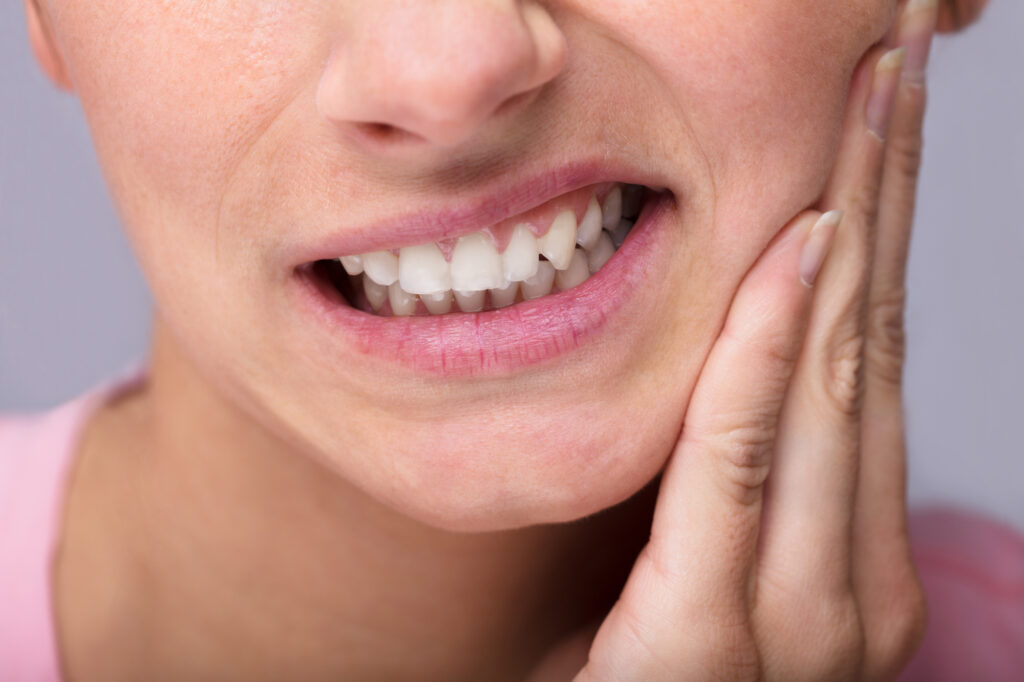
Have you ever felt a sharp, sudden pain when your teeth come into contact with something hot, cold, sweet, or very acidic? Tooth sensitivity is a common dental issue that affects many people at some point in their lives.
While occasional tooth sensitivity might not always be a cause for alarm, it may signal a more serious underlying problem.
What Causes of Tooth Sensitivity?
Tooth sensitivity is actually a tooth enamel problem. Enamel makes up the outermost portion of the tooth, protecting it from the outside world. When this enamel layer gets thinner or when gum recession exposes the underlying surface of the tooth’s root (the root is not protected by enamel), nerves become more exposed, and tooth sensitivity can be the result.
Should You Worry About Tooth Sensitivity?
Tooth sensitivity is quite common. It has been estimated that up to a third of people experience it. So, when does this type of tooth discomfort suggest something more serious?
When Sensitivity Becomes Persistent
Occasional tooth sensitivity might not be unusual, especially if you expose your teeth to an extreme temperature or if you’ve recently had a dental procedure. But if you find that the pain lingers for longer periods or becomes a constant part of your life, it’s time to get it checked out.
Persistent sensitivity can indicate enamel wear, gum disease, or even a cracked tooth. If your morning coffee or ice cream at dinner consistently causes discomfort, book an appointment with your dentist to rule out any serious conditions.
When Sensitivity is Severe
When tooth sensitivity escalates from a minor discomfort to severe pain, it can indicate a more serious problem, such as an abscess or an advanced infection. Severe pain might not only be triggered by temperature or food but could also be constant or throbbing, disrupting sleep and daily activities. In these cases, see your dentist immediately.
If Sensitivity Is Accompanied by Other Symptoms
If you experience sensitivity along with symptoms like gum bleeding or swollen gums, these are red flags. For instance, gum disease not only causes sensitivity but can lead to more severe conditions like periodontitis if left untreated. Similarly, cavities can expose the sensitive inner parts of the tooth, leading to pain and infection. These accompanying symptoms often indicate the need for professional dental care ASAP.
Sensitivity That Limits Your Daily Life
When tooth sensitivity starts to dictate what you can eat or drink, preventing you from enjoying your favorite foods or even causing you to avoid certain foods altogether, it’s a clear sign that you should bring this up to your dentist.
Adjusting your life around your tooth sensitivity not only diminishes your quality of life but also suggests that the underlying issue could be worsening. Early intervention can prevent more severe outcomes and possibly save your tooth from further damage.
Treating Tooth Sensitivity
You don’t have to live with the discomfort of tooth sensitivity every day. Luckily, there are ways to address this common issue.
Understanding the Causes
First, it is important to understand the root cause of your tooth sensitivity. Several factors can contribute, including brushing too hard, which can wear down enamel, gum disease that exposes the tooth root, cracked teeth or teeth worn by grinding, and plaque buildup that leads to tooth decay. Moreover, dental procedures, such as whitening treatments, can also temporarily increase tooth sensitivity.
If there is a more serious underlying issue, treating that can improve your discomfort. On the other hand, if your tooth sensitivity is simply a result of weakened enamel, fluoride treatment and specialized toothpaste may be all you need.
Preventing Tooth Sensitivity
Prevention is always preferable to treatment. Good oral hygiene practices, including brushing gently twice every day with a soft-bristled toothbrush, flossing daily, and using fluoride toothpaste, can help prevent sensitivity. Additionally, avoiding acidic foods and drinks that can erode enamel and wearing a mouthguard if you grind your teeth at night can protect your teeth from becoming sensitive.
Lumineers Can Help
One surprising treatment for tooth sensitivity is Lumineers. While these ultra-thin veneers are a popular choice to improve the appearance of teeth, they can also act as a protective barrier, improving tooth sensitivity. If you don’t have any serious underlying dental conditions, yet fluoride treatments and special toothpaste hasn’t helped, talk to us about whether Lumineers may be an option for you.
See Your Dentist for Solutions
It’s always better to err on the side of caution when it comes to tooth sensitivity. A visit to our office can help identify the root cause of your discomfort. If you are suffering from tooth sensitivity, book an appointment today.